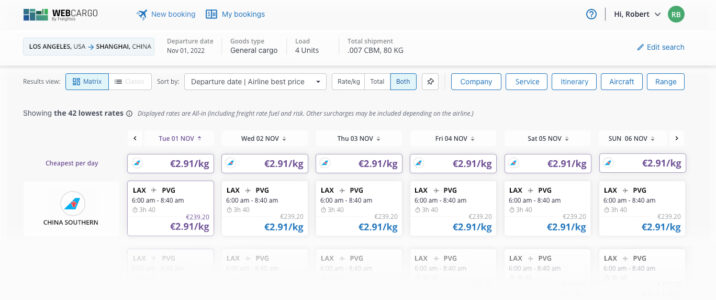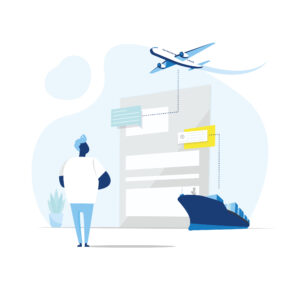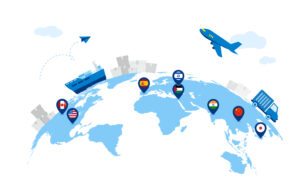Unlocking Asia with China Southern Cargo, and what it means for forwarders and airlines.

Asia. A hub of global manufacturing centers. Importing 2.069 trillion U.S. dollars worth of goods in 2021 alone, China undoubtedly represents one of the largest segments of global air cargo trade.
“Asia, particularly China, is currently one of the most important global manufacturing centers,” notes Chengqing Tao, Executive Vice President of China Southern Air Logistics.
As a result, Asia has huge air cargo volumes to put it lightly.
But to survive and thrive in the upcoming decade, even the giants in the air cargo industry must adapt to a new reality with new expectations from shippers…which means
Airlines around the world are therefore looking to stay ahead of the curve in order to meet the ever-evolving needs of their customers. China Southern Cargo joining the WebCargo platform therefore signifies the transformation of the Chinese air cargo market, by allowing freight forwarders direct access to China import bookings. This is critical not only for regional customer acquisition and retention, but also to maintain global supply chain reliability and access through the crucial flexibility provided by platforms such as WebCargo.
Manel Galindo, the CEO of WebCargo expands on the importance of truly cross-border bookings: “With digital consumer products, it is more understandable that regional platforms, like Facebook and WeChat emerge. But with something so inherently global, like international freight, the value of being digitized on a single platform far outweighs any benefits brought by fragmented digitization.”
China Southern Cargo: Leading the charge
China Southern Cargo has recognized the rapid shift towards carrier digitization. For good reason – airlines are eager to meet the level of visibility, efficiency and speed air cargo customers are hungry for, and which can only be provided through online booking platforms. Here’s why.
“The traditional way of data transmission heavily relies on manual entry and paperwork. It’s very time-consuming and lacks accuracy,” Chengqing explains.

This ultimately translates into lower sales costs and the ability to direct resources away from repetitive tasks and towards adding value and improving the customer experience. China Southern is therefore separating itself from the pack as a leading Chinese carrier through early digital adoption in a region that still relies heavily on a manual quoting and booking process.
A streamlined airline with over 800 aircraft?
With an immense fleet of over 800 aircraft, China Southern Cargo is also leveraging the benefits of digitization with WebCargo to optimize the process of information transmission to its customers.
“eBooking is undoubtedly very useful in streamlining the process of information transmission,” Chengqing remarks.
eBooking is a low-touch way of helping carriers keep their customers updated of changes in real time, enabling cargo to be booked at the last minute even on new or adjusted schedules. This carries with it the potential to improve utilization through selling capacity, whose availability would previously be nearly impossible to communicate to customers in time. A win for both forwarders and carriers.
In addition to this obvious gain for both carriers and forwarders, Chengqing points to several additional (and significant) wins that come with carrier digitization, chief among them being, “enhance[d] operations efficiency, optimize[d] organization structure, improve[d] performance and provid[ing] quality service to valued customers.”
Digital booking capabilities generate data that contribute to improved business intelligence – the data unlocked through eBooking allows carriers to develop a data-driven strategy, and improve their offering by region or customer type, as well as their customer communication.
Alongside developing this eBooking capability, China Southern Cargo is also keeping up with the 50% of global capacity available online for instant air cargo rate search on third party platforms like WebCargo. China Southern recognizes the customer demand for the ability to access updated prices based on real-time changes to capacity and schedules (which also provides new pricing and utilization opportunities for carriers).
Through its partnership with WebCargo, forwarders will therefore gain access to a unique combination of real-time booking for actual capacity across China Southern’s extensive route network, alongside digital payments, helping forwarders quickly book and reconcile payments, as well as making faster and more-informed pricing decisions.
The bottom line in two lines from Chengqing
“China Southern Cargo has always been committed to meeting the demands of our customers and acting as a bridge between Asia and the rest of the world,” Chengqing explains.
Reach.
The best offerings and customer experience provided by even the largest carriers are meaningless without an audience. China Southern Cargo is embracing digitization as a low-cost avenue to expand its ‘shop window’ to new markets. Digitization through platforms like WebCargo enables access to carriers not only for large forwarders, but for smaller ones too. This often neglected customer segment is now easily accessible to carriers, and although small, can often represent a significant expansion for a carrier in aggregate.
Asia Unlocked: What it all means
The digitization of the first Chinese airline represents the beginning of a potentially huge shift in the region for large and small forwarders alike, with the recognition that B2C standards in a B2B world are quickly becoming the norm. China Southern Cargo is leading the way in this key market, with an offering that brings customers the transparency, efficiency and reliability that they are used to.
And happy customers are loyal customers: Top performing carriers recognize that digitizing their cargo operations represents not just an additional channel for extended reach, but new opportunities – such as access to real-time rates and capacity – that fundamentally change how airlines can play to win as the bar to gain and retain business gets raised ever higher.


